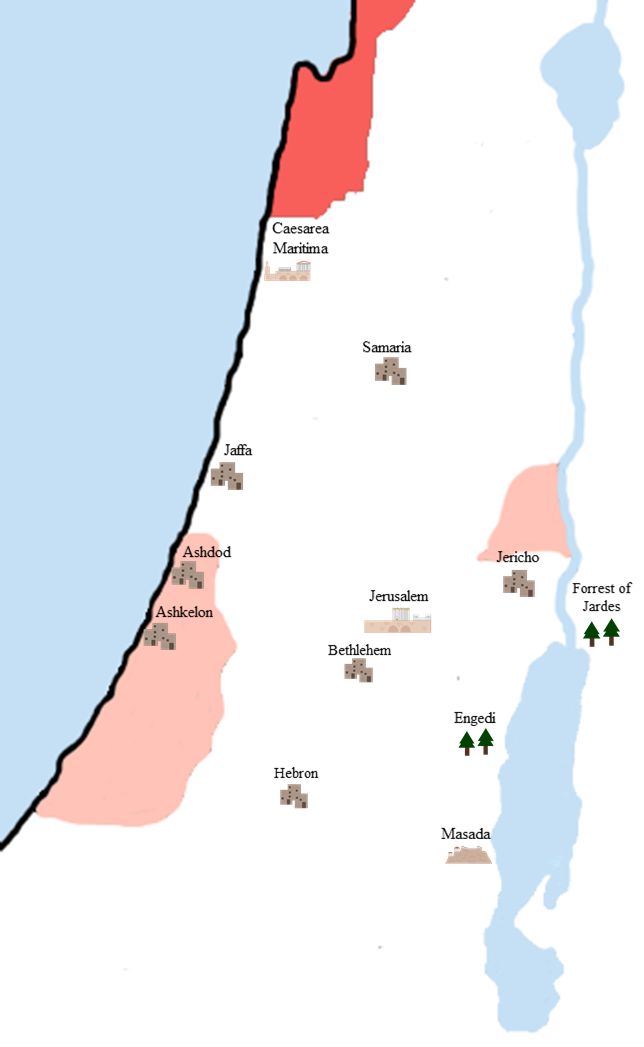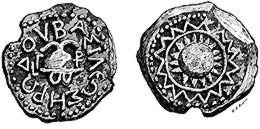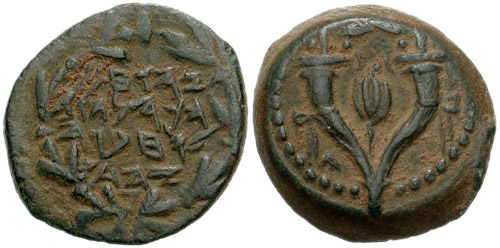|
Costobarus
Costobarus (Greek: Κοστόβαρος) was an associate of Herod the Great (who made Costobarus governor of Idumea) and second husband of Herod's sister Salome I. He was also known as Costobar.{{cite book, last1=Flavius, first1=Josephus (93 CE), last2=Marcus, first2=Ralph ranslatorlast3=Wikgren, first3=Allen ranslatortitle=Jewish Antiquities., date=1990, publisher=Harvard University Press, location=Cambridge, Massachusetts, isbn=0-674-99451-5, edition=Loeb Classical Library Another member of the Herodian dynasty was Costobar, who was the brother of Saul. Both Saul and Costobar were likely grandsons of Costobarus. Costobar(us), husband of Salome Costobarus was an associate of Herod during the latter’s rise to power. Following the capitulation of Jerusalem in 37 BC during the campaign by Mark Antony and Herod against the Hasmonean king Antigonus II - Costobar controlled the exits from the city.Josephus “Antiquities” xv: 260-266 Around this time, Antony appointed Herod a ... [...More Info...] [...Related Items...] OR: [Wikipedia] [Google] [Baidu] |
Salome I
Salome I (ca. 65 BCE – ca. 10 CE) was the sister of Herod the Great and the mother of Berenice by her husband Costobarus, governor of Idumea. She was a nominal queen regnant of the toparchy of Iamnia, Azotus, Phasaelis from 4 BCE. Life She first married Joseph ( :fr:Joseph (iduméen)), whom she accused of familiarities with Mariamne, wife of Herod, and thus procured his death.Salome entry in The Cyclopedia of Biblical, Theological and Ecclesiastical Literature by James Strong and [...More Info...] [...Related Items...] OR: [Wikipedia] [Google] [Baidu] |
Idumea
Edom (; Edomite: ; he, אֱדוֹם , lit.: "red"; Akkadian: , ; Ancient Egyptian: ) was an ancient kingdom in Transjordan, located between Moab to the northeast, the Arabah to the west, and the Arabian Desert to the south and east.Negev & Gibson (ed.), 2001, ''Edom; Edomites'', pp. 149–150 Most of its former territory is now divided between present-day southern Israel and Jordan. Edom appears in written sources relating to the late Bronze Age and to the Iron Age in the Levant. Edomites are related in several ancient sources including the Tanakh, a list of the Egyptian pharaoh Seti I from c. 1215 BC as well as in the chronicle of a campaign by Ramesses III (r. 1186–1155 BC). Archaeological investigation has shown that the nation flourished between the 13th and the 8th century BC and was destroyed after a period of decline in the 6th century BC by the Babylonians. After the fall of the kingdom of Edom, the Edomites were pushed westward towards southern Judah by ... [...More Info...] [...Related Items...] OR: [Wikipedia] [Google] [Baidu] |
Baba Ben Buta
Baba ben Buta () was a Jewish sage who lived at the time of Herod the Great, who is mentioned in the Talmud. Biography He may have been a member of the prominent family known as ''The Sons of Baba'' ("Bnei Baba"), who, at the time of the siege of Jerusalem by Herod (37 BC), resisted its surrender, and whom Costobarus protected from the wrath of Herod for twelve years, until they were discovered and put to death. Baba ben Buta is also the subject of several traditions which are found in the Babylonian Talmud. While Baba ben Buta supposedly lived in the 1st century, the extensive traditions about him come from the 4th to the 8th centuries, when this Talmud was composed and redacted. According to a tradition preserved in the Babylonian Talmud, Baba ben Buta was the only teacher of the Law who was spared by Herod. According to this tradition it was Baba ben Buta, deprived of his eyesight by Herod, who advised Herod to rebuild the Temple in expiation of his great crimes. The following ... [...More Info...] [...Related Items...] OR: [Wikipedia] [Google] [Baidu] |
Greek Language
Greek ( el, label=Modern Greek, Ελληνικά, Elliniká, ; grc, Ἑλληνική, Hellēnikḗ) is an independent branch of the Indo-European family of languages, native to Greece, Cyprus, southern Italy (Calabria and Salento), southern Albania, and other regions of the Balkans, the Black Sea coast, Asia Minor, and the Eastern Mediterranean. It has the longest documented history of any Indo-European language, spanning at least 3,400 years of written records. Its writing system is the Greek alphabet, which has been used for approximately 2,800 years; previously, Greek was recorded in writing systems such as Linear B and the Cypriot syllabary. The alphabet arose from the Phoenician script and was in turn the basis of the Latin, Cyrillic, Armenian, Coptic, Gothic, and many other writing systems. The Greek language holds a very important place in the history of the Western world. Beginning with the epics of Homer, ancient Greek literature includes many works of lasting impo ... [...More Info...] [...Related Items...] OR: [Wikipedia] [Google] [Baidu] |
Herod The Great
Herod I (; ; grc-gre, ; c. 72 – 4 or 1 BCE), also known as Herod the Great, was a Roman Jewish client king of Judea, referred to as the Herodian kingdom. He is known for his colossal building projects throughout Judea, including his renovation of the Second Temple in Jerusalem and the expansion of the Temple Mount towards its north, the enclosure around the Cave of the Patriarchs in Hebron, the construction of the port at Caesarea Maritima, the fortress at Masada, and Herodium. Vital details of his life are recorded in the works of the 1st century CE Roman–Jewish historian Josephus. Herod also appears in the Christian Gospel of Matthew as the ruler of Judea who orders the Massacre of the Innocents at the time of the birth of Jesus, although most Herod biographers do not believe that this event occurred. Despite his successes, including singlehandedly forging a new aristocracy from practically nothing, he has still been criticised by various historians. His reign pola ... [...More Info...] [...Related Items...] OR: [Wikipedia] [Google] [Baidu] |
Mark Antony
Marcus Antonius (14 January 1 August 30 BC), commonly known in English as Mark Antony, was a Roman politician and general who played a critical role in the transformation of the Roman Republic from a constitutional republic into the autocratic Roman Empire. Antony was a relative and supporter of Julius Caesar, and served as one of his generals during the conquest of Gaul and the Civil War. Antony was appointed administrator of Italy while Caesar eliminated political opponents in Greece, North Africa, and Spain. After Caesar's assassination in 44 BC, Antony joined forces with Marcus Aemilius Lepidus, another of Caesar's generals, and Octavian, Caesar's great-nephew and adopted son, forming a three-man dictatorship known to historians as the Second Triumvirate. The Triumvirs defeated Caesar's killers, the ''Liberatores'', at the Battle of Philippi in 42 BC, and divided the government of the Republic between themselves. Antony was assigned Rome's eastern provinces, includi ... [...More Info...] [...Related Items...] OR: [Wikipedia] [Google] [Baidu] |
Antigonus II Mattathias
Antigonus II Mattathias ( grc-gre, Αντίγονος ''Antígonos''; he, , ''Matīṯyāhū''), also known as Antigonus the Hasmonean (died 37 BCE) was the last Hasmonean king of Judea. A puppet king installed by the Parthians, he was the son of King Aristobulus II of Judea. In 37 BCE Herod handed him over to the Romans for execution, after Antigonus's three-year reign during which he led the Jews' fierce struggle for independence against the Romans. Rome Antigonus was the second son of Aristobulus II, and together with his father, were carried off to Rome as prisoners by Pompey in 63 BCE. Antigonus eventually escaped and returned to Judaea in 57 BCE. Despite an unsuccessful attempt to oppose the Roman forces there, the senate released him, yet he refused to surrender his dynastic rights. After the death of his older brother Alexander, Antigonus claimed that his uncle Hyrcanus II was a puppet of the Idumaean Antipater and attempted to overthrow him with the help and consent o ... [...More Info...] [...Related Items...] OR: [Wikipedia] [Google] [Baidu] |
John Hyrcanus
John Hyrcanus (; ''Yōḥānān Hurqanōs''; grc, Ἰωάννης Ὑρκανός, Iōánnēs Hurkanós) was a Hasmonean ( Maccabean) leader and Jewish high priest of the 2nd century BCE (born 164 BCE, reigned from 134 BCE until his death in 104 BCE). In rabbinic literature he is often referred to as ''Yoḥanan Cohen Gadol'' (), "John the High Priest". Name Josephus explains in ''The Jewish War'' that John was also known as "Hyrcanus", but does not explain the reason behind this name. The only other primary source, the Books of the Maccabees, never used this name with respect to John. The single occurrence of the name ''Hyrcanus'' in 2 Maccabees 3:11 refers to a man to whom some of the money in the Temple belonged during the c. 178 BCE visit of Heliodorus. The reason for the name is disputed amongst biblical scholars, with a variety of reasons proposed: * Familial origin in the region of Hyrcania on the Caspian Sea * A Greek regnal name, which would have represented closer ... [...More Info...] [...Related Items...] OR: [Wikipedia] [Google] [Baidu] |
Fam Costobar
Fam or FAM is a colloquial term for 'family and friend' or an acronym of 'friend and mate' especially for intimate friends. It may also refer to: People * Anthony Famiglietti (born 1978), American athlete * Fam Ekman (born 1946), Swedish-Norwegian children's writer and illustrator * Fam Irvoll (born 1980), Norwegian fashion designer * Konstantin Fam (born 1972), Russian filmmaker Sport * Football Association of Malawi * Football Association of Malaysia * Football Association of Maldives * Fútbol Americano de México Other uses * ''Fam'' (TV series), an American television sitcom that debuted in 2019 * Fam Islands in Indonesia * Fam language * Family (other) * Fat acceptance movement * Federal Air Marshal, in the United States * Federation of Associations of Maharashtra, an Indian trade association * Fertility awareness method * File Alteration Monitor * ''Filipinas, Ahora Mismo'', a Philippine radio show * Filipino American Museum, in New York City * Fitchbu ... [...More Info...] [...Related Items...] OR: [Wikipedia] [Google] [Baidu] |
Aristobulus Of Britannia
Aristobulus of Britannia is a Christian saint named by Hippolytus of Rome (170–235) and Dorotheus of Gaza (505–565) as one of the Seventy Disciples mentioned in and as the first bishop in Roman Britain. Full title in various languages * English: ''Saint Aristibule the Old, Apostle, Martyr, and First Bishop of Britain'' * grc-gre, Ἅγιος Ἀριστόβουλος, ἐπίσκοπος Βρετανίας, ἀδελφός τοῦ ᾿Αποστόλου Βαρνάβα, translit. ''Hagios Aristoboulos episkopos Brettanias, adelphos tou apostolou Barnaba'', transcr. (Byzantine/Modern) ''Aghios Apostolos Aristovoulos, episkopos Vrettanias, adelfos tou apostolou Varnava'' ("The Holy Apostle Aristobulus, Bishop of Britain, brother of the Apostle Barnabas") * la, Sanctus Aristobulus Senex, Apostolus, Martyr, Episcopus Primus Britanniae * Welsh: ''Arwystli Hen Episcob Cyntaf Prydain'' ("Aristibule the Old, First Bishop of Britain") Traditions Pseudo-Hippolytus lists "Aristob ... [...More Info...] [...Related Items...] OR: [Wikipedia] [Google] [Baidu] |






